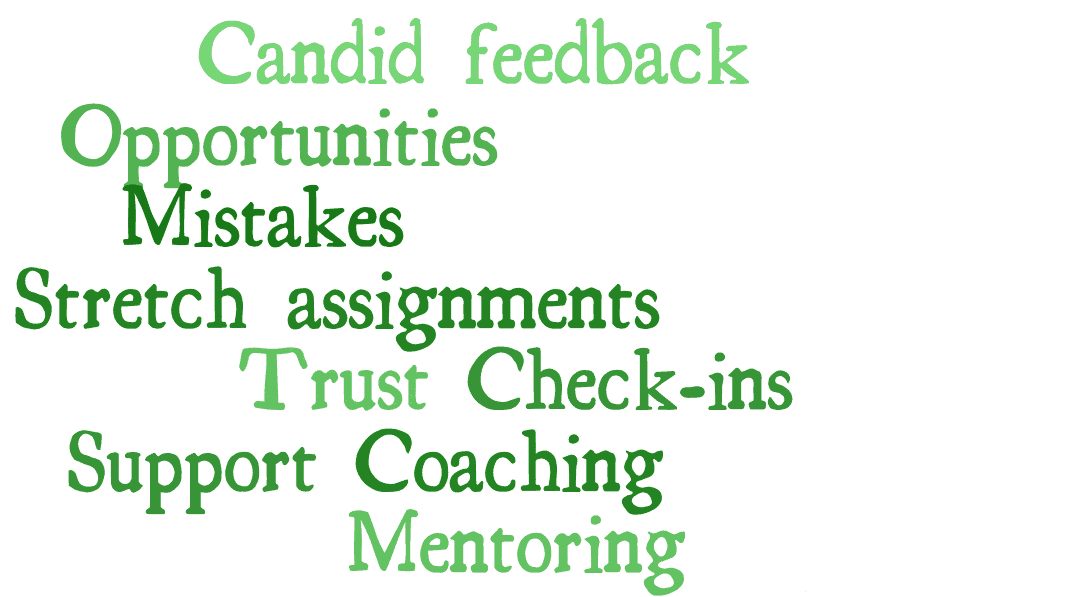Global field research over the past decade consistently leads to the same conclusion:
The simple human act of helping p eople grow has become very complicated.
eople grow has become very complicated.
Processes overshadow people. Deadlines trump genuine development. And a checklist mentality competes with creating authentic connections.
But interviews with and input from thousands of leaders worldwide offer a different view of what’s needed to support genuine and sustainable career development. When asked specifically what helped them develop most powerfully, 8500+ leaders offered these observations.
At its core, career development is all about conversation, commitment, opportunities, and culture. And organizations that understand this enjoy a range of benefits:
- Employees are more loyal, engaged, and satisfied.
- Customers experience higher levels of service.
- Everyone is more effective because talents and skills are continually being upgraded and challenged.
- Innovation flourishes as employees are willing to invest their discretionary effort.
- Sales, profits, and margins rise.
Cultures that support career development can look very different… but they—and their leaders—tend to share the following characteristics.
INFORMATION-RICH
Meaningful career development demands that leaders be present enough with others to consistently bring candor to their interactions. The organization must operate in a transparent fashion, sharing its strategy, job requirements, and required competencies so that employees might align with them. Honest and helpful information about performances, perceptions, and possibilities is what employees need to own their development and to drive it forward. This means that managers must be deliberate about building trust as they make coaching a top priority.
CURIOUS
Curiosity supports information-rich relationships among leaders and employees. Approaching work and people with a genuine inquisitiveness is key; but authentic organizational curiosity involves more than just good questions. It’s about actively seeking out diverse and divergent points of view. It’s also about celebrating experimentation and risk-taking, even when it doesn’t pay off.
PATIENT (WITH THE DEVELOPMENT PROCESS)
In today’s environment, where results are monitored by the hour and ‘long term’ means next week, patience is in short supply. But leaders who make career development a reality rather than a rallying slogan appreciate the value in focusing on a slightly longer horizon. They balance short-term business needs with the longer-term needs of the business. They demonstrate flexibility to accommodate the learning needs of the full range of employees. And they don’t need to wrap things up immediately but rather allow thoughts, ideas, and opportunities to evolve organically over time.
RESULTS-FOCUSED
Development is a big-picture game. What are we trying to achieve? What are our goals? Focusing broadly on results—and being less rigid (within reason) about how they are accomplished—provides a wide berth within which employees can experiment, try out new talents and skills, approach tasks differently, and grow their capacities. Leadership clarity about the ‘what’ can allow for more creativity around the ‘how’, creating countless vehicles for development.
BLURRY AROUND BOUNDARIES
Cultures that support career development tend to have leaders with very blurry vision. Rather than hard lines between departments or divisions, they see opportunities to collaborate. Instead of ‘us’ and ‘them,’ they see how ‘all of us’ are in this together. Rather than looking out for themselves, they look out for the enterprise. These sorts of leaders actively encourage development because they can look outside of their own areas for opportunities to learn, contribute, and grow. And they’re willing to move people around and even lose good talent to their colleagues as a way to support the development of employees.
LEARNING-ORIENTED
Nearly every organization professes that it’s a ‘learning organization,’ but few truly rise to that level. An authentic learning orientation is based upon a deep and abiding belief that everyone can learn and grow—and the commitment to making development available to everyone. If leaders dedicate a significant portion of their time to teaching others and if everyone at every level is expected to learn from his or her experience and help the organization benefit from those experiences, then you might have a genuine learning-oriented culture.
Organizations—and leaders—that possess these characteristics are serious about career development. And the culture that’s cultivated in the process grows not only their people but also their businesses.
How would you evaluate your organization’s culture against these characteristics? What steps can you take to help build a culture that supports career development? Complete this self-assessment to identify opportunities to leverage strengths and improve upon opportunities: Culture Survey Self-Assessment


